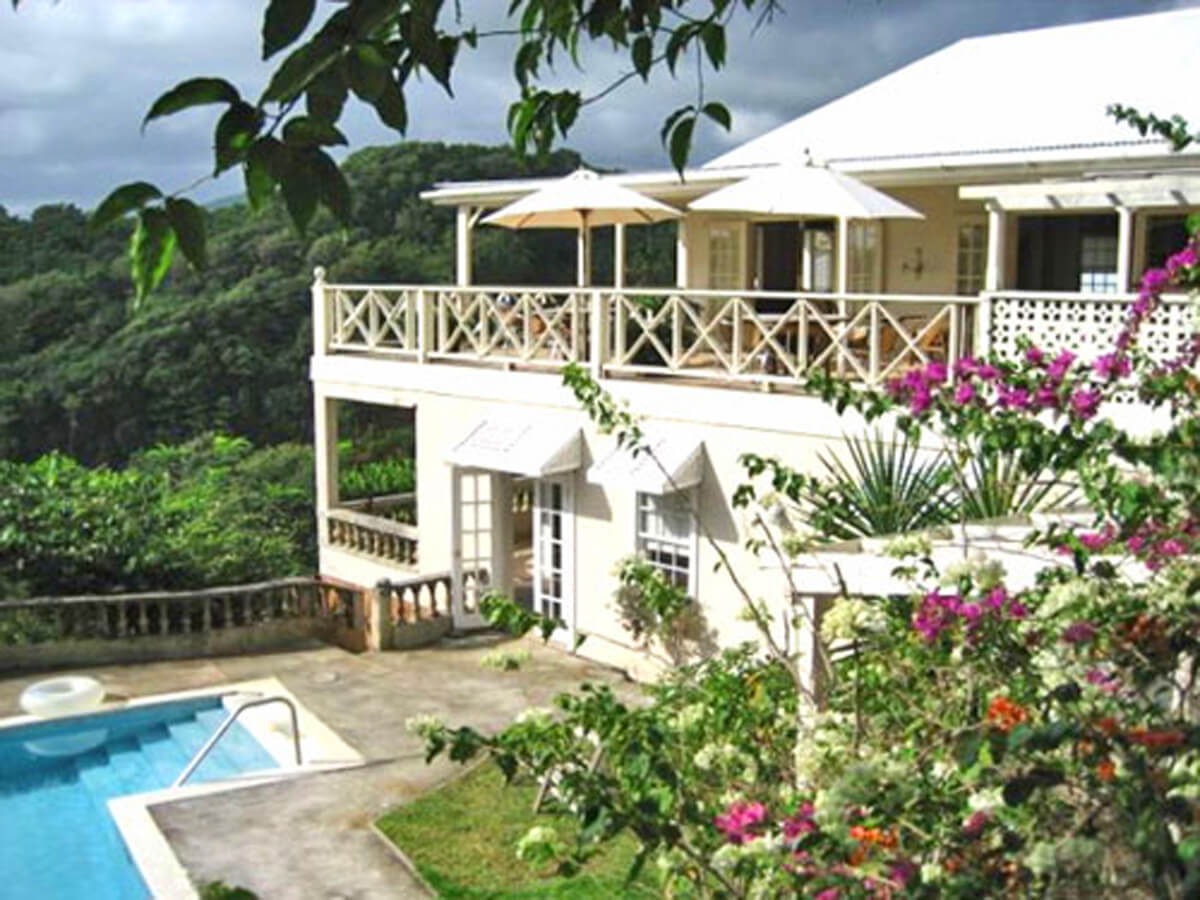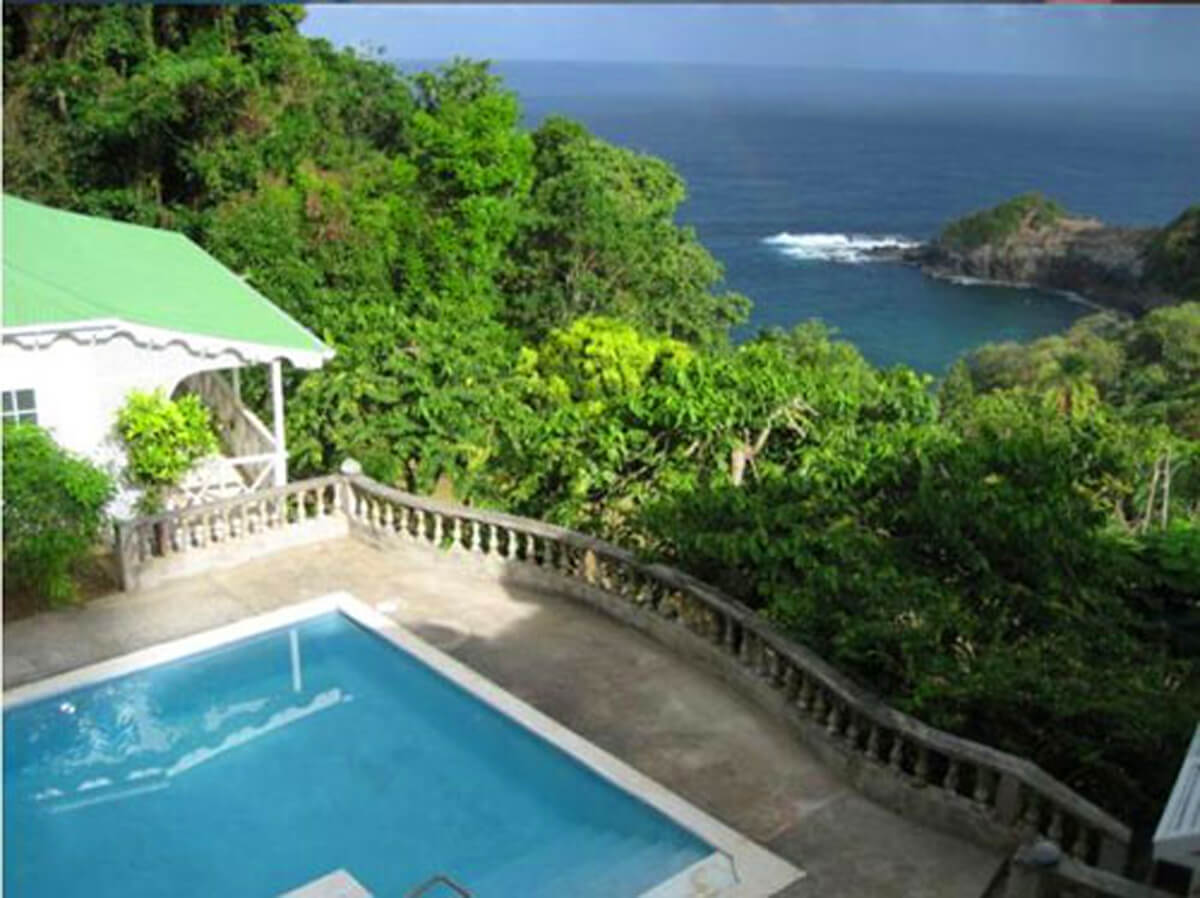
Friday

Sipping cocktails on the top deck of the Beau Rive Hotel--an 8-room inn on the northeastern coast of Dominica, the "Nature Island of the Caribbean"--it's easy to imagine that little has changed here in the last five centuries. Dominica, in fact, was the very last island in the Caribbean to be colonized by the Europeans, thanks in large part to the rugged topography (the island is the top of a volcanic ridge jutting from the junction of the Caribbean and Atlantic), and the fierce Carib Indians who made their last stand here.
"You can almost imagine Columbus' ships passing by this bay," Shawna says, nodding at the rocky, jungle-cloaked cove right below us.
It's not surprising that British owner Mark Steele, a soul music aficionado who worked in the movie business, chose this corner of Dominica for his luxurious guest house in 1999. The Beau Rive is only a half-hour drive from the international airport (it takes at least 90 minutes to reach the capital of Roseau from the airport) and the wild beauty of this side of the island is stunning.
Our room is classic colonial. Mark, who built the entire hotel from the ground up, tells us the flooring is made from polished purpleheart wood imported from Guyana, and the simple but elegant furniture is made from local crab wood. The linens are a creamy white and two sets of French doors with louvered windows overlook the bay. We're in room #5 and share a long balcony with the two rooms on either side. Shawna is headed down to cool off in the pool, which looks a bit like it was imported directly from Tuscany.
Saturday
We spent the day exploring the Carib Territory, a 3,700-acre reservation of land set aside for the last of the Carib Indians. The tour, organized by Mark, was a fascinating glimpse of a people who, unlike most of the Dominicans who are descended from West African slaves, come from the northern coast of South America. "I always thought the Caribs had vanished long ago," said a German tourist, echoing our own thoughts. But here in this corner of Dominica, the culture is still strong.
At the Kalinago Cultural Center we joined a guide who took us around a working Carib village complete with sleeping huts, canoe-building areas and a swimming pool with a waterfall. The Caribbean Sea, our guide tells us, takes its name from the word "Carib." Carib was what the Arawak-speaking inhabitants of the region called the Kalinago people; it meant "aggressors."
Back at Beau Rive tonight we enjoyed a surprisingly British supper including Welsh rarebit and fish patties. A number of guests staying elsewhere showed up to dine as well, since Beau Rive has a romantic outdoor seating area overlooking the coast.
Sunday
Where most Caribbean islands have to import water, Dominica is blessed with an abundance. The locals like to say there are 365 rivers streaming from the 4,500-foot mountains, "one for every day of the year."
Shawna and I went waterfall hopping today and discovered a lost world. Our driver with Ken's Hinterland Adventure Tours (KHATTS) took us first to the aptly named Emerald Pool. It was a five-minute walk from the visitor center to a gorgeous free-hanging waterfall that bubbled into a perfect natural swimming pool. Our timing was perfect; the cruise ship tours were gone, so we had the fern-rimmed pool all to ourselves.
After lunch in Roseau, the capital, we headed about a half hour up into the hills to the Trafalgar Falls, twin waterfalls that free-fall 200 feet in beautiful milky horsetails. We joined a nature hike and then went for a swim in the cool water and warmed up later with a soak in a nearby hot spring.
Mark has told us to rest up tomorrow. The next day we are embarking on the epic 12-mile hike to the Boiling Lake, one of only a handful of flooded volcanic craters in the world. This island, says Shawna, is National Geographic's version of the Caribbean. I scrape the mud off our boots as she heads up for dinner, and I have to agree.
"You can almost imagine Columbus' ships passing by this bay," Shawna says, nodding at the rocky, jungle-cloaked cove right below us.
It's not surprising that British owner Mark Steele, a soul music aficionado who worked in the movie business, chose this corner of Dominica for his luxurious guest house in 1999. The Beau Rive is only a half-hour drive from the international airport (it takes at least 90 minutes to reach the capital of Roseau from the airport) and the wild beauty of this side of the island is stunning.
Our room is classic colonial. Mark, who built the entire hotel from the ground up, tells us the flooring is made from polished purpleheart wood imported from Guyana, and the simple but elegant furniture is made from local crab wood. The linens are a creamy white and two sets of French doors with louvered windows overlook the bay. We're in room #5 and share a long balcony with the two rooms on either side. Shawna is headed down to cool off in the pool, which looks a bit like it was imported directly from Tuscany.
Saturday
We spent the day exploring the Carib Territory, a 3,700-acre reservation of land set aside for the last of the Carib Indians. The tour, organized by Mark, was a fascinating glimpse of a people who, unlike most of the Dominicans who are descended from West African slaves, come from the northern coast of South America. "I always thought the Caribs had vanished long ago," said a German tourist, echoing our own thoughts. But here in this corner of Dominica, the culture is still strong.
At the Kalinago Cultural Center we joined a guide who took us around a working Carib village complete with sleeping huts, canoe-building areas and a swimming pool with a waterfall. The Caribbean Sea, our guide tells us, takes its name from the word "Carib." Carib was what the Arawak-speaking inhabitants of the region called the Kalinago people; it meant "aggressors."
Back at Beau Rive tonight we enjoyed a surprisingly British supper including Welsh rarebit and fish patties. A number of guests staying elsewhere showed up to dine as well, since Beau Rive has a romantic outdoor seating area overlooking the coast.
Sunday
Where most Caribbean islands have to import water, Dominica is blessed with an abundance. The locals like to say there are 365 rivers streaming from the 4,500-foot mountains, "one for every day of the year."
Shawna and I went waterfall hopping today and discovered a lost world. Our driver with Ken's Hinterland Adventure Tours (KHATTS) took us first to the aptly named Emerald Pool. It was a five-minute walk from the visitor center to a gorgeous free-hanging waterfall that bubbled into a perfect natural swimming pool. Our timing was perfect; the cruise ship tours were gone, so we had the fern-rimmed pool all to ourselves.
After lunch in Roseau, the capital, we headed about a half hour up into the hills to the Trafalgar Falls, twin waterfalls that free-fall 200 feet in beautiful milky horsetails. We joined a nature hike and then went for a swim in the cool water and warmed up later with a soak in a nearby hot spring.
Mark has told us to rest up tomorrow. The next day we are embarking on the epic 12-mile hike to the Boiling Lake, one of only a handful of flooded volcanic craters in the world. This island, says Shawna, is National Geographic's version of the Caribbean. I scrape the mud off our boots as she heads up for dinner, and I have to agree.
 By Thom
By Thom